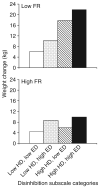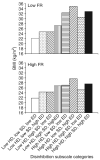Aspects of eating behaviors "disinhibition" and "restraint" are related to weight gain and BMI in women
- PMID: 18223612
- PMCID: PMC2713727
- DOI: 10.1038/oby.2007.12
Aspects of eating behaviors "disinhibition" and "restraint" are related to weight gain and BMI in women
Abstract
Objective: The causes of adult weight gain leading to obesity are uncertain. We examined the association of adult weight gain and obesity with subscales of eating behavior characteristics in older women.
Methods and procedures: Current height and weight, eating behavior subscales (disinhibition subscales-habitual, situational, and emotional; restraint subscales-flexible and rigid; hunger subscales-internal and external) as assessed using the Eating Inventory (EI), and self-reported body weight at six prior age intervals were reported by 535 women aged 55-65 years. Multiple regression analysis was used to examine the relationships between EI subscale scores and weight change from the age interval of 30-39 to 55-60 years and current BMI.
Results: The strongest correlate of weight gain over 20 years was susceptibility to overeating in response to everyday cues within the environment (habitual disinhibition; partial correlation coefficient (r) = 0.25, P < 0.001); susceptibility to overeating in response to emotional states such as depression (emotional disinhibition) was a quantitatively weaker but significant correlate (partial r = 0.17, P < 0.001), and susceptibility to overeating in response to specific situations such as social occasions (situational disinhibition) was not associated with weight gain. Flexible control of dietary restraint attenuated the influence of habitual disinhibition in particular on weight gain and BMI, and was less effective in attenuating associations of emotional or situational disinhibition.
Discussion: Lifestyle modification programs for prevention and treatment of adult-onset obesity currently focus on reducing situational and emotional overeating; the results of this study suggest that a stronger emphasis on strategies that target habitual overeating may be warranted.
Figures


References
-
- Cornoni-Huntley JC, Harris TB, Everett DF, et al. An overview of body weight of older persons, including the impact on mortality. The National Health and Nutrition Examination Survey I—Epidemiologic Follow-up Study. J Clin Epidemiol. 1991;44:743–753. - PubMed
-
- Williamson DF. Descriptive epidemiology of body weight and weight change in U.S. adults. Ann Intern Med. 1993;119:646–649. - PubMed
-
- Dietary Guidelines Advisory Committee . US Departments of Agriculture and Health and Human Services. GPO; Washington DC: 2005. Dietary Guidelines for Americans, 2005. HHS Pub. HHS-ODPHP-2005-01-DGA-A; < http://www.health.gov/dietaryguidelines/dga2005/document/>.
-
- Shai I, Jiang R, Manson JE, et al. Ethnicity, obesity, and risk of type 2 diabetes in women: a 20-year follow-up study. Diabetes Care. 2006;29:1585–1590. - PubMed
Publication types
MeSH terms
Grants and funding
LinkOut - more resources
Full Text Sources
Medical

